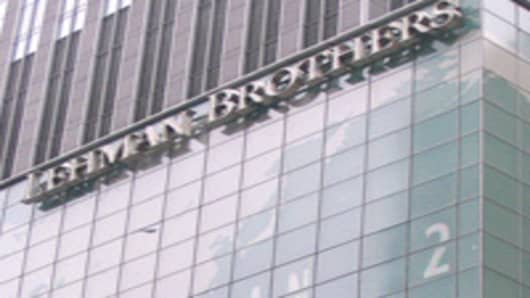Lehman Brothers became the latest bank to take steps to shore up its funding after markets closed Monday, announcing that it will issue $3 billion of convertible preferred shares.
Subsequent to the announcement, Lehman Chief Financial Officer Erin Callan told CNBC that the deal is sold.
A group of large, long-term institutional investors in Lehman will receive a dividend yield of 7-7.5 percent, and the price being paid will mark a premium of between 30-35 percent on the shares.
Lehman shares fell nearly 5 percent in aftermarket trading after the planned offering was announced.
Rumors have swirled around Lehman since the demise of Bear Stearns, but Lehman says it has over $200 billion of assets it could sell or borrow against, and that its ability to borrow from the Federal Reserve should dispel questions about its solidity.
Sector-Wide Problems
Global investors will soon be swamped by an estimated $100 billion of debt and equity issued by U.S. banks and financial institutions undergoing repairs, even as appetite for these securities is receding.
Investors in banks have had to watch their financial stock holdings plummet in value as the sector's earnings remain under pressure with the credit crisis pushing up funding costs and squeezing margins.
But with the U.S. economy slowing further, financial institutions are likely to suffer from even more bad debts — which have analysts warning that they will soon have to raise capital to counter the effects on their balance sheets.
"Shadow banks will likely be forced to raise expensive capital and/or reduce the bottom line footings of their balance sheets," said Bill Gross, chief investment officer for Pacific
Investment Management Co, or Pimco,home to the world's biggest bond fund, in his April investment outlook.
This "shadow banking system," which consists of all the levered investment conduits, vehicles and structures created by major investment banks, is now facing liquidity constraints.
But over the past six months, to sell new bonds, U.S. banks have had to pay up to 100 basis points more in yield premiums than on their outstanding debt.
Since November, the likes of Citigroup , UBS ,Morgan Stanley and Merrill Lynch have raised some $80 billion in capital. But a wide swath of financial services firms are likely to need more.
"The entire banking system out to the securities industry would be undercapitalized if the write-downs continue at a rapid pace in the next few quarters," said Chris Low, chief
economist at FTN Financial in New York.
Analysts estimate $100 billion more will need to be raised — $80 billion by financial institutions, and $20 billion by home finance firms Fannie Mae and Freddie Mac.
What has been raised so far "will look inexpensive when compared to the rates of future capital raises, which will likely come in the form of rights offerings," Oppenheimer analyst Meredith Whitney said in an investor note last week.
"We consider each offering separately based on price and credit considerations," Pimco's Gross told Reuters. Pimco has about $746 billion in assets under management.
Sovereign wealth funds were prominent in the first round of capital raising from November to January, with the Abu Dhabi Investment Authority and the Government of Singapore Investment Corp (GIC), along with others, putting more than $26 billion into Citigroup, and GIC investing $15.6 billion in UBS.
But the prospect of financial firms tapping capital markets again could get a chilly reception from international investors who have since grown weary of U.S. assets -- or been burned.
China Investment Corp's stake of almost 10 percent in Blackstone Group LP, which cost $3 billion, has lost about 40 percent of its value since the private equity giant's initial public offering in June.
Furthermore, Citigroup shares have lost about 30 percent since the beginning of the year.
The Bear Stearns fire sale did not help either.
"If banks need to raise capital, they'll have to provide generous terms that will entice the investor," said Keith Wirtz, president and chief investment officer of Fifth Third Asset Management, which manages $22.5 billion.
The flood of new capital-raising is partly why U.S. financial stocks have faced renewed pressure, traders say.
Last week, the Amex Securities Broker-Dealer index dropped nearly 10 percent, after climbing 15 percent the week before following the U.S. Federal Reserve's aggressive action to inject cash into the banking system.
In mid-March, the Fed dusted off a Depression-era rule to let securities firms borrow directly from the Fed through its "discount window," helping to restore investors' confidence.
While this helped, investors are still concerned that the value of risky mortgage securities will deteriorate more as home prices continue to fall.
For now, Wirtz said "we would wait to buy these types of stocks that have more toxic portfolios, have taken write-downs, have had to raise outside capital, and fire CEOs."
"The appetite still exists but the due diligence process will be much more thorough, questions will be much more pointed," said Bruce Foerster, a former managing director at Lehman Bros who has since founded Miami-based investment firm South Beach Capital Markets.
- Reuters contributed to this report.


